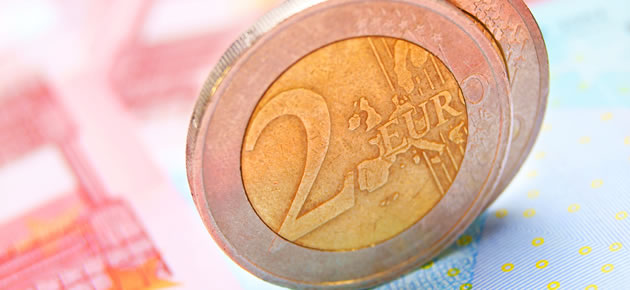European Central Bank President Mario Draghi caused the Euro to soften against peers like the US Dollar by asserting that forward guidance should help push the common currency lower.
Draghi intimated that a weaker domestic currency would ease the Eurozone’s inflation pressures and the Euro accordingly weakened.
While speaking in Vienna Draghi stated that the ECB’s forward guidance policy; ‘creates a de facto loosening of policy stance, as real interest rates are set to fall over the projection horizon. At the same time, the real interest-rate spread between the Euro area and the rest of the world will probably fall, thus putting downward pressure on the exchange rate, everything else being equal.’
However, while the Euro did soften at the words it largely held gains against the Pound.
As European trading progressed on Friday Sterling was in line to post five-day declines against both the Euro and US Dollar.
The British asset came under pressure as data showed that the UK’s trade deficit widened and UK construction output slowed in January.
With UK exports dropping to their lowest level for over 18 months the UK’s goods deficit swelled to 9.793 billion Pounds in the first month of the year.
Economists had expected the deficit to swell from 7.662 billion to 8.6 billion.
Britain’s overall trade deficit widened from 668 million at the close of last year to 2.565 billion Pounds in January.
Meanwhile, the construction output report showed that seasonally adjusted output increased by 1.8 per cent in January, month-on-month, down from a 2.0 per cent gain in December.
On the year construction output was up 5.4 per cent.
The Euro was little affected by German inflation figures. The report confirmed that consumer prices in the Eurozone’s largest economy increased by 0.5 per cent in February.
Next week several influential European reports will be responsible for directing EUR/GBP movement.
Eurozone inflation figures will be of particular interest given the ECB’s decision to refrain from introducing additional stimulus, but UK employment data and the publication of the Bank of England meeting minutes could also have a notable impact.
If the Eurozone’s inflation report inspires deflation fears the prospect of the ECB introducing a rate cut in April could rise and the Euro could fall.
Before the close of trade Ukraine developments and the US University of Michigan confidence gauge may cause further market movement.
Euro (EUR) Exchange Rates
[table width=”100%” colwidth=”50|50|50|50|50″ colalign=”left|left|left|left|left”]
Currency, ,Currency,Rate ,
Euro, ,US Dollar,1.3886 ,
,US Dollar,1.3886 ,
Euro, ,British Pound,0.8357 ,
,British Pound,0.8357 ,
Euro, ,Australian Dollar,1.5386,
,Australian Dollar,1.5386,
Euro, ,New Zealand Dollar,1.6240,
,New Zealand Dollar,1.6240,
Euro, ,Canadian Dollar,1.5387,
,Canadian Dollar,1.5387,
[/table]



